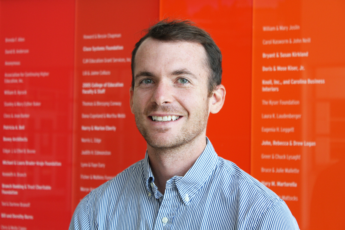2022-2023 Program Evaluation and Education Research (PEER) Group Undergraduate Internship Report
Executive Summary
The Program Evaluation and Education Research (PEER) Group at the Friday Institute at North Carolina State University developed an innovative undergraduate internship program in the 2020 – 2021 academic year. The two-semester-long paid internship was developed to provide undergraduate students from underserved communities with exposure to educational research and evaluation opportunities, and it is paid for through Federal Work-Study grants with supplemental funding from the Friday Institute’s Executive Director. The internship emphasizes that no prior research experience is required to help create more equitable pathways for paid internship opportunities.
Now in its third year, the program continues to adapt to meet intern and PEER Group team member needs. This evaluation documents the strengths and areas of growth of the internship program. This program evaluation found that interns developed technical research and evaluation skills, such as learning software programs to help with both quantitative and qualitative data analysis. Further, they gained skills that could be transferable to other workplaces. For example, interns gained confidence, learned how to be leaders, and honed their presentation skills. PEER Group members also benefited from having interns on the team, making them more efficient in their work.
This year’s evaluation produced a number of recommendations to help make the internship more effective moving forward. These include having regular check-ins between interns and PEER Group members, conducting more in-person meetings for better communication and camaraderie, and providing more networking opportunities for interns.
Evaluation Findings
- How, and to what extent, did the PEER internship program expose interns to the environment and expectations of educational research and evaluation?
Students participating in the internship program were exposed to new experiences in the fields of educational research and evaluation. Prior to the internship, they had a vague idea of what educational research was, but it was not until their experience in the internship that they had a clear understanding of it. The knowledge they gained also revealed how research and evaluation has real world impacts. Interns understood that the work they were assisting PEER Group members with impacted real people. Finally, as the interns became more familiar with the tasks and had a solid understanding of research, they grew their confidence to be able to contribute to and create educational products, including internal- and external-facing products.
- How, and to what extent, did the PEER internship program develop interns’ transferable workforce skills?
Interns gained valuable experiences supporting their development of workforce skills. They learned valuable soft and technical skills that could easily be transferred to other settings and contexts. These included the ability to locate relevant research as well as developing strong written communication skills.
Interns also demonstrated initiative in their work, and they took opportunities to be leaders. Further, they developed their sense of professionalism while delivering quality products. This was particularly notable when communicating with PEER Group members and presenting research during academic conferences.
- How, and to what extent, did the PEER internship program enhance PEER Group operations?
Interns provided the PEER Group with invaluable assistance during its third year of operation. Interns were quick to learn new tasks, and they saved the PEER Group time, including in analyzing data. As the interns gained more experience, they took on more complicated tasks and they could disseminate research findings to a wider audience at public events, such as conferences.
Recommendations
- Hold regular meetings between the PEER Group supervisor and interns. Interns expressed wanting more guidance and interaction with the PEER Group team. Without regular meeting times, interns faced challenges, such as feeling as if they were not part of a larger team. In the future, the PEER Group supervisor should consider setting aside time each week or month to meet with the interns.
- In-person meetings would add to a positive internship experience. While there were advantages to having a completely remote internship, such as flexibility, interns would benefit from more in-person meetings or gatherings. In-person work could contribute to team building, and it could offer opportunities to practice research skills in person, something that is limiting in a completely remote experience.
- Create a list of expectations for PEER interns. It would benefit PEER Group interns if they had more guidelines for the program’s expectations. This could include outlining how often they should be checking in with their supervisors, ways to communicate absences or issues they are facing in their work, and requirements for attending meetings. A more structured approach to the internship could be beneficial for students so they have a clear understanding of the internship’s role.
- Create a standards of practice document for the Lead Intern. As lead interns are undergraduate students, they are still learning how to lead and mentor others. To be successful in this position, it would be beneficial to provide more resources for the lead intern, including a standards of practice document. This could lay out ideas for ways that interns are supposed to operate as well as provide resources that could help the lead intern when faced with questions from other interns. A resource like this may also cut down the necessity to reach out the intern supervisor with questions that could be answered by this document.
- Hold a networking event or meeting for PEER interns and the Friday Institute staff. Undergraduate interns would benefit from having more opportunities to meet with Friday Institute staff. As the Friday Institute does a lot more than program evaluation and educational research, providing interns with opportunities to expand their knowledge of what the Friday Institute does and make connections with others could benefit them, especially when applying for jobs in the future.
View Resource

Related Resources
This evaluation report details the implementation and impact of this program during its second year.
This brief summarizes the pilot year evaluation report that details the implementation and impact of the Program Evaluation and Education Research (PEER) internship program for undergraduate students. Findings suggest that the program was successful in accomplishing its three goals.
This evaluation report details the implementation and impact of this program during its pilot year. Findings suggest that the program was successful in accomplishing its three goals.
Projects
The Program Evaluation and Education Research (PEER) Internship Program for Undergraduate Students
This internship is a paid work-study opportunity for undergraduate students to learn new research, evaluation and leadership skills. Interns will receive training in educational research and evaluation techniques while contributing to PEER Group projects.
Published
2023
Resource Type
Report
Published By
Friday Institute for Educational Innovation
Suggested Citation
Ardines, T., Dixon, M., Edwards, C.W., Hann, L., & Winn, K. (2023). The Program Evaluation and Education Research (PEER) Undergraduate Internship Report, Year 3 Evaluation Report. Raleigh, NC. Friday Institute for Educational Innovation at the NC State University College of Education.




